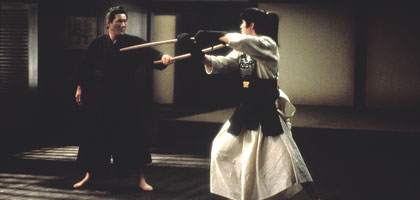
Love, honour and obey
Film of the Month: Gohatto

Nagisa Oshima's Gohatto tells of sex and swordsmanship among the samurai. Philip Strick unveils its layers of meaning
With a shower of white cherry blossom, director Nagisa Oshima ends Gohatto - much as, 10 years ago, he framed his autobiographical documentary Kyoto, My Mother's Place. There, in typically ambivalent symbolism, the cascading petals were shown to prompt picnics and dancing among the citizens, a response scorned, Oshima reported, by his strong-willed and independent widowed mother, who had no time for such frivolity. Undecided as he wandered the decorated landscape whether to cherish Kyoto's temporary beauty or to burn the place down, Oshima finally admitted to defiance of maternal abstinence and proposed to get drunk. But the tension between respect for the past and concern for the future while coping with the fallible present is an established Oshima theme, and the emblematic cherry sapling in Gohatto finds him once again irresolute.
Gohatto is set in 1860s Kyoto, among the elite samurai Shinsen-gumi militia. At the simple story level, the 'death' of the sapling - felled with a single sword-swipe by second-in-command Hijikata ('Beat' Takeshi) - appears to signal that the newly recruited samurai Kano (Ryuhei Matsuda), a troublemaker too beautiful for anybody's good, has been despatched. But the fallen blossoms, a lone blaze of purity on the drizzled heathland, suggest much else, from the arguable innocence of Kano (he's accused of murdering a fellow samurai, but his on-screen admission of guilt and execution are denied us) to the chopping short of all future prospects for the military tradition the Shinsen-gumi stands for.
Underlying the story of Kano is a period of historical catharsis: 1865 was the year when western warships anchored off Kyoto to enforce a treaty that would destroy the centuries-old Shogunate system and transfer the newly empowered emperor from Kyoto to Edo (renamed Tokyo). A postscript considered for Gohatto pointed out that within two years of the Kano incident the samurai age was at an end, and the Shinsen-gumi militia (including Hijikata, Okita, Kondo and Inoue, four of its founders) were dead. Significantly, this perspective is omitted. As a result, Hijikata and his tree more readily assume the stateless status of previous Oshima protagonists, with implications outside any specific time and place.
The film's final scenes, staged in studio-bound disregard for authenticity, are a jumble of imagined and 'real' encounters as Hijikata tries to work out the truth about Kano's admirers. Supposedly in hiding in order to witness Kano's attack on his lover Tashiro, Hijikata and his long-term colleague Okita stand openly nearby, surely in plain sight. The effect is both to suggest the inevitability of legend and to make us consider alternatives. The most striking of these would be that in felling the sapling Hijikata has severed himself from his own inadmissible interest in the taboo of Kano.
The wake-up call that sounds with the arrival of Kano at the Shinsen-gumi headquarters - a microcosm of the inflexibly feudal condition of Kyoto - is a familiar fanfare in Oshima's work. His earliest films, which placed him in the 1960s at the forefront of an acclaimed Japanese new wave, were replete with Godardian outsiders, among them the US fighter pilot captured by villagers in the 1961 The Catch/Shiiku and the amorphous Korean outcasts in the astonishingly surrealistic Three Resurrected Drunkards/Kaette Kita Yopparai (1973). And with increasing vehemence the primary challenge offered by Oshima's disruptive invaders was sexual, though always with political reference, culminating in the starkly confrontational Empire of the Senses/Ai No Corrida (1976), which left little scope for further manoeuvre. Like addenda to a complete text, Merry Christmas Mr. Lawrence (1982) and Max Mon Amour (1986) offer variations on the same theme of sexual obsession, in which the consequences of erotic rule-breaking are considered with mingled humour and despair.
Unlike, however, the martyred Major Celliers in Merry Christmas Mr. Lawrence, Kano brings no apparent guilt or inhibition to his sudden absorption by a sealed community (in which sense, perhaps, he is more like Max the innocent chimpanzee). "He has something other than courage," comments Hijikata when Kano performs a relatively neat beheading, but the nature of this hidden quality is never entirely clear: Kano remains an enigma. Masked by flawlessly ambiguous features (even a slash across the brow is briskly healed) and flowing hair which he refuses to trim, he is unresponsive to the advances of fellow recruit Tashiro; the only embrace to which he is seen to submit is that of the older samurai Yuzawa, whose wild fumblings appear to evoke little more than boredom, except, perhaps, when they approach strangulation.
As if a kind of plague-carrier, himself uninfected, Kano might even be interpreted as being inspired only by violence. ("I joined the militia," he says, "in order to have the right to kill.") Properly respecting his elders - as illustrated when he makes his own swordsmanship look bad when pitted against former leader Inoue - he calmly attends to the duties assigned him. It's the rest of the Shinsen-gumi troop who are in disarray, all motives and decrees open to suspicion, all actions questioned for possible bias. Oshima makes light of most of this, even resorting to interpolated titles that read like newspaper headlines ("Rumor! Kano is still a virgin!") to update us on militia speculation. There's considerable amused chatter about people who "have the look of leaning that way", and much is made of the clownishly stolid Yamazaki, the only person for whom Kano admits affection.
Not too seriously, perhaps, the film gradually turns itself into a whodunit, only tentatively resolved by Kano's final scuttle into obscurity. That Okita goes after him (we have to assume this, as Okita doesn't admit to anything) offers a further solution, uncomfortable to Hijikata, in which Okita has observed that the presence of Kano has caused an as-yet unrecognised rift in the relationship between Kondo, the troop's present leader, and Hijikata, his lieutenant. If they have begun to compete for "ownership" of the youth, the unity of the Shinsen-gumi organisation is in jeopardy, along with the entire Shogunate. Probably to alert Hijikata to the risks, Okita tells him the celebrated story (Pledge of the Chrysanthemum) of a pact between a scholar and a samurai which results in an act of ultimate loyalty when the samurai, although dead, turns up for a promised dinner party. Hijikata rather obtusely wonders if reading such stuff might signify that Okita is of dubious persuasion, but Okita quickly puts him straight: "I hate this kind of people - but I love beautiful stories." The clear hint is that Okita, a champion of loyalty, has at the very least been both an observer and a manipulator behind the Kano affair. We might also note that Oshima, on the other hand, hates nobody and, wonderfully served by cast and camera, loves the reticence of a story immaculately told.
